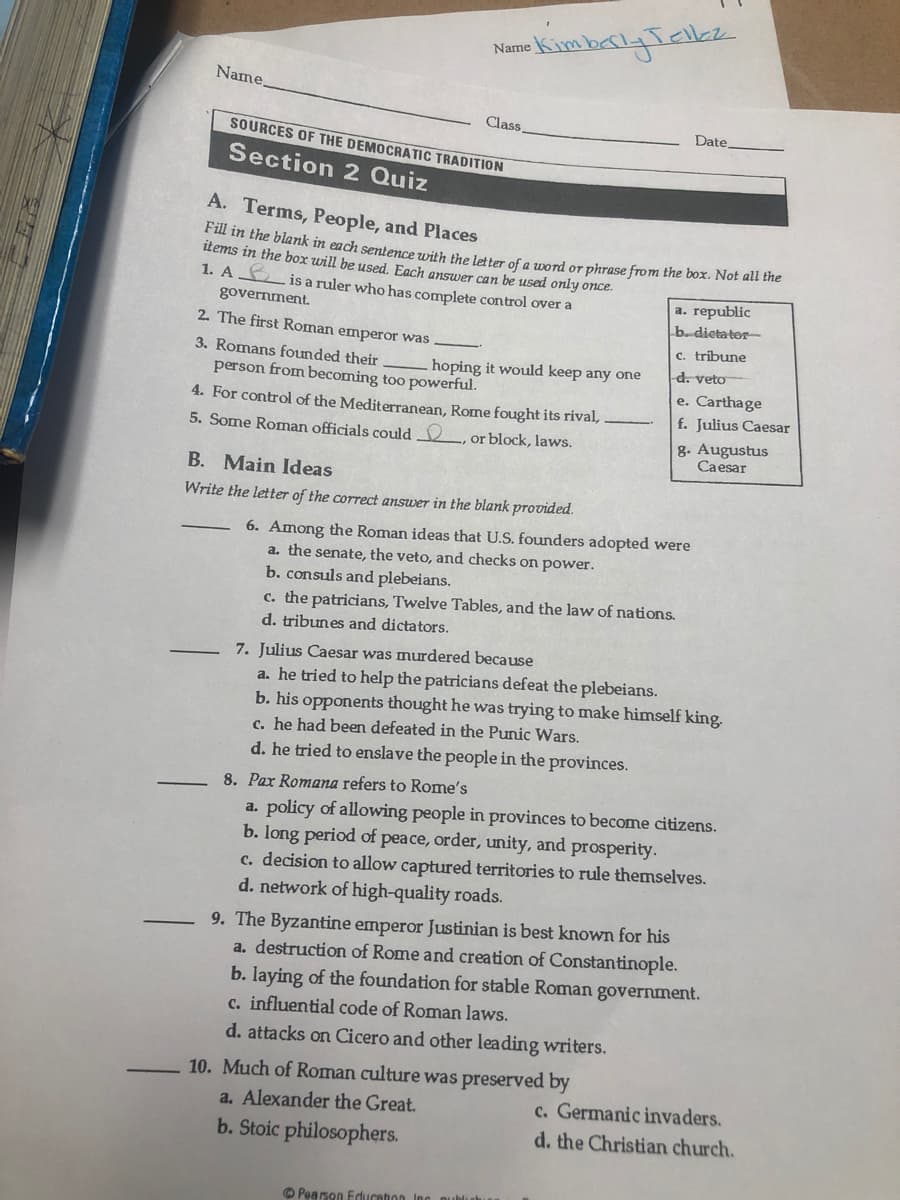Write the letter of the correct answer in the blank provided. 6. Among the Roman ideas that U.S. founders adopted were a. the senate, the veto, and checks on power. b. consuls and plebeians. c. the patricians, Twelve Tables, and the law of nations. d. tribunes and dictators. 7. Julius Caesar was murdered because a. he tried to help the patricians defeat the plebeians. b. his opponents thought he was trying to make himself king. c. he had been defeated in the Punic Wars. d. he tried to enslave the people in the provinces. 8. Pax Romana refers to Rome's a. policy of allowing people in provinces to become citizens. b. long period of peace, order, unity, and prosperity. c. decision to allow captured territories to rule themselves. d. network of high-quality roads. 9. The Byzantine emperor Justinian is best known for his a. destruction of Rome and creation of Constantinople. b. laying of the foundation for stable Roman government. c. influential code of Roman laws. d. attacks on Cicero and other leading writers. _10. Much of Roman culture was preserved by a. Alexander the Great. c. Germanic invaders. b. Stoic philosophers. d. the Christian church.
Write the letter of the correct answer in the blank provided. 6. Among the Roman ideas that U.S. founders adopted were a. the senate, the veto, and checks on power. b. consuls and plebeians. c. the patricians, Twelve Tables, and the law of nations. d. tribunes and dictators. 7. Julius Caesar was murdered because a. he tried to help the patricians defeat the plebeians. b. his opponents thought he was trying to make himself king. c. he had been defeated in the Punic Wars. d. he tried to enslave the people in the provinces. 8. Pax Romana refers to Rome's a. policy of allowing people in provinces to become citizens. b. long period of peace, order, unity, and prosperity. c. decision to allow captured territories to rule themselves. d. network of high-quality roads. 9. The Byzantine emperor Justinian is best known for his a. destruction of Rome and creation of Constantinople. b. laying of the foundation for stable Roman government. c. influential code of Roman laws. d. attacks on Cicero and other leading writers. _10. Much of Roman culture was preserved by a. Alexander the Great. c. Germanic invaders. b. Stoic philosophers. d. the Christian church.
Related questions
Question

Transcribed Image Text:Name
Name
Class
SOURCES OF THE DEMOCRATIC TRADITION
Date
Section 2 Quiz
A. Terms, People, and Places
Fit in the blank in each sentence with the letter of a word or phrase from the box. Not all the
items in the box will be used. Each answer can be used only once.
1. A is a ruler who has complete control over a
a. republic
b dietater-
government.
2. The first Roman emperor was
c. tribune
3. Romans founded their
person from becoming too powerful.
hoping it would keep any one
d. veto
e. Carthage
f. Julius Caesar
4. For control of the Mediterranean, Rome fought its rival,
5. Some Roman officials could , or block, laws.
8. Augustus
Caesar
B. Main Ideas
Write the letter of the correct answer in the blank provided.
6. Among the Roman ideas that U.S. founders adopted were
a. the senate, the veto, and checks on power.
b. consuls and plebeians.
c. the patricians, Twelve Tables, and the law of nations.
d. tribunes and dictators.
7. Julius Caesar was murdered because
a. he tried to help the patricians defeat the plebeians.
b. his opponents thought he was trying to make himself king.
c. he had been defeated in the Punic Wars.
d. he tried to enslave the people in the provinces.
8. Pax Romana refers to Rome's
a. policy of allowing people in provinces to become citizens.
b. long period of peace, order, unity, and prosperity.
c. decision to allow captured territories to rule themselves.
d. network of high-quality roads.
9. The Byzantine emperor Justinian is best known for his
a. destruction of Rome and creation of Constantinople.
b. laying of the foundation for stable Roman government.
c. influential code of Roman laws.
d. attacks on Cicero and other leading writers.
10. Much of Roman culture was preserved by
c. Germanic invaders.
d. the Christian church.
a. Alexander the Great.
b. Stoic philosophers.
O Pearson Education Inc
Expert Solution
This question has been solved!
Explore an expertly crafted, step-by-step solution for a thorough understanding of key concepts.
This is a popular solution!
Trending now
This is a popular solution!
Step by step
Solved in 2 steps
